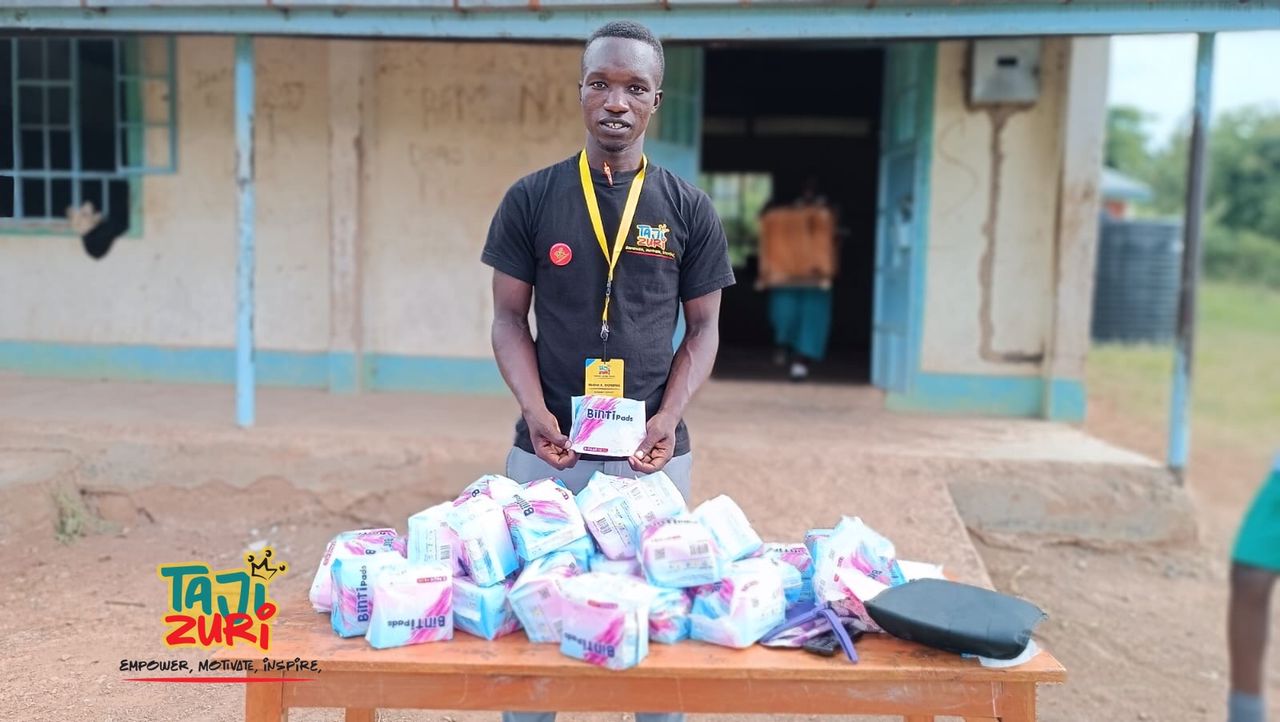Introduction
Access to sanitary products is a fundamental right for all girls, yet many students around the world face significant barriers in obtaining them.
Globally, period poverty affects millions, limiting access to sanitary products and Menstrual hygiene education.
Regionally, disparities in economic and infrastructural development further deepen the crisis, particularly in low-income and rural areas.
Nationally, governments are making strides in policy formulation, but implementation gaps still remain.
At the county level, Homabay, local initiatives and community-driven efforts, such as those by TajiZuri, are playing a crucial role in ensuring that young girls in schools have access to essential sanitary products. Recognizing this urgent need, various organizations have stepped in to bridge the gap. Among them, TajiZuri has emerged as a beacon of hope, actively working to address these challenges
The Importance of Affordable and Accessible Sanitary Products
Menstrual hygiene is important to the well-being and dignity of young girls. However, the reality for many is stark—high costs and limited availability prevents them from managing their periods safely and comfortably.
The consequences of Inadequate Menstrual hygiene management include:
- Increased School Absenteeism: Many girls miss school during their periods due to lack of proper Menstrual products, leading to poor academic performance.
- Health Risks: Using unsafe alternatives such as cloth rags, newspapers, or other unhygienic materials can lead to infections and long-term reproductive health issues.
- Social Stigma and Psychological Impact: Many cultures still hold negative perceptions about menstruation, leading to shame, embarrassment, and discrimination
Multi-faceted approach in addressing challenges on Menstrual hygiene
A multi-faceted approach to addressing challenges in Menstrual hygiene is crucial in ensuring that young girls in schools have access to proper menstrual health management. By focusing on policy changes, education, and the provision of affordable menstrual products, we can create a more inclusive and supportive environment. Below is an expanded discussion of these key aspects:
1. Policy Changes
Policies play a fundamental role in ensuring menstrual hygiene is prioritized in schools and communities. Governments, educational institutions, and organizations must work together to implement policies that support menstrual health.
- Menstrual Health in Public Health Policies: Governments should recognize menstrual hygiene as a public health issue and integrate it into national health programs.
- Tax Exemption on Menstrual Products: Reducing or eliminating taxes on sanitary products can make them more accessible to low-income individuals.
- School Policies on Menstrual Hygiene Management (MHM): Schools should have clear policies ensuring clean and private washrooms, proper disposal facilities, and availability of sanitary products.
- Workplace & Institutional Support: Organizations should implement menstrual-friendly policies, such as paid menstrual leave or flexible work schedules for those experiencing severe menstrual discomfort.
2. Educating About Menstrual Health
Lack of awareness and misinformation about menstruation can lead to stigma, embarrassment, and poor hygiene practices. Education is key to breaking taboos and empowering individuals with knowledge by ensuring there is:
- School-Based Menstrual Health Education: Incorporating menstrual health into school curriculums helps normalize discussions around menstruation.
- Community Awareness Programs: Engaging parents, teachers, and community leaders in menstrual health conversations can reduce stigma.
- Male Involvement: Educating boys and men about menstruation fosters understanding and support, reducing bullying and discrimination.
- Use of Digital & Social Media Campaigns: Online platforms can spread awareness, share menstrual hygiene tips, and debunk myths surrounding menstruation.
3. Provision of Affordable Menstrual Products in Schools
One of the biggest barriers to menstrual hygiene is the lack of access to affordable sanitary products. Schools can play a significant role in ensuring students do not miss school due to menstruation.
- Free Menstrual Product Distribution: Schools should provide free sanitary pads or tampons to students, similar to how they provide essential learning materials.
- Reusable & Sustainable Options: Schools and communities can promote cost-effective and eco-friendly options like menstrual cups, reusable cloth pads, or biodegradable products.
- Sanitary Vending Machines: Installing vending machines that dispense free or low-cost menstrual products in schools and public spaces can enhance accessibility.
- Partnerships with NGOs & Private Sectors: Collaborating with organizations that provide menstrual products at subsidized costs can help sustain such programs.
By addressing these areas simultaneously, we can create an environment where menstruation is no longer a barrier to education and well-being.
How TajiZuri’s is Promoting Access to Sanitary Products
TajiZuri is a community-driven organization dedicated to improving the lives of underprivileged girls by providing them with essential resources, including sanitary products. The organization has been instrumental in implementing sustainable solutions to ensure that no girl has to miss school due to her periods. TajiZuri is making a difference by:
1. Providing Free and Subsidized Sanitary Products
TajiZuri distributes free or low-cost sanitary pads to schools in underserved communities. By doing so, they help alleviate the financial burden on families who may struggle to afford these basic necessities.
2. Menstrual Health Education
Beyond distributing products, TajiZuri conducts Menstrual health education programs to break the silence about menstruation. These initiatives teach girls about Menstrual hygiene, dispel myths, and foster a supportive environment for open discussions.
3. Advocacy for Policy Changes
TajiZuri actively engages with policymakers and educational institutions to push for long-term solutions, such as integrating Menstrual hygiene management into school health programs and ensuring government funding for free sanitary products in schools.
4. Sustainable and Eco-Friendly Solutions
Recognizing the environmental impact of disposable pads, TajiZuri promotes the use of reusable sanitary products such as Menstrual cups and cloth pads. They provide training on how to use and maintain these products, making Menstrual health both affordable and sustainable.
CONCLUSION
Ensuring that girls have access to affordable and accessible sanitary products is not just about hygiene; it’s about education, dignity, and equality. Organizations like TajiZuri play a crucial role in addressing period poverty and empowering young girls to stay in school with confidence. By supporting organizations like TajiZuri, societies can take a significant step towards breaking the barriers that prevent girls from achieving their full potential. Menstrual hygiene should never be a luxury. It is a right that every girl deserves.



